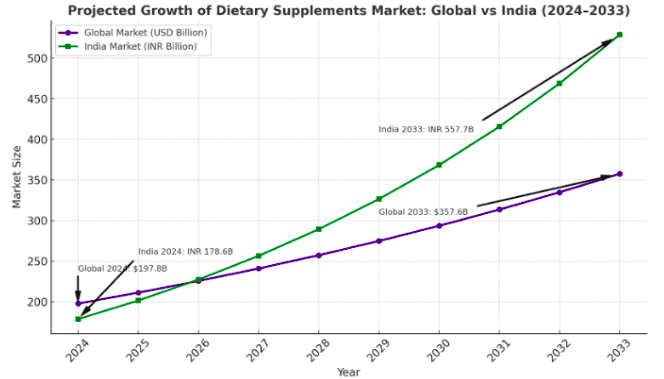
Over the last two decades, the use of dietary supplements (DS) has grown steadily worldwide, becoming an integral part of preventive healthcare and modern wellness practices. This growth was further accelerated during the COVID-19 pandemic, when concerns over immunity, vaccine shortages, and risks of inflammation drove many people to seek supplements as a complementary approach to protection and recovery.
The dietary supplements market is experiencing strong momentum worldwide. Globally, it is projected to grow from USD 197.8 billion in 2024 to nearly USD 357.6 billion by 2033, advancing at a compound annual growth rate (CAGR) of 6.8%. This growth reflects the increasing demand for a broad range of products, spanning vitamins, minerals, herbal extracts, amino acids, probiotics, fatty acids, and proteins, delivered through tablets, capsules, powders, liquids, and newer consumer-friendly formats.
In India, the market outlook is even more dynamic. Recent estimates suggest that the Indian dietary supplements market will expand from INR 178.6 billion in 2024 to approximately INR 557.7 billion by 2033, at a CAGR of 12.82%. Rising health awareness, urbanization, and a growing focus on preventive healthcare are driving this surge. Like global trends, Indian consumers are embracing a wide mix of supplement types and formats, making them a regular part of daily health routines.

With changing lifestyles, aging populations, and a stronger emphasis on wellness, dietary supplements are steadily shifting from being “optional add-ons” to becoming everyday essentials. People are increasingly turning to these products not only to bridge nutritional gaps but also to boost immunity, support healthy aging, enhance physical performance, and promote overall well-being.
Support your wellness, find the perfect supplement for you!
Types of Global Dietary Supplements

Botanicals
Plant-based supplements derived from herbs, fruits, and other botanicals continue to gain traction as consumers turn to natural remedies rooted in traditional healing practices. Popular choices include adaptogens such as ashwagandha and turmeric, often featured in blends designed to reduce stress, support immune function, and enhance cognitive health.
Vitamins
Vitamins remain at the heart of the market as essential micronutrients. Trends show a rising demand for personalized formulations designed around age, lifestyle, and specific health needs. Since the pandemic, immune-related vitamins like C and D have seen especially strong growth, while beauty-focused products that use vitamins for skin, hair, and nail health are also expanding rapidly.
Minerals
Core minerals such as calcium, magnesium, zinc, and iron continue to attract steady demand due to their roles in bone health, stress management, and fatigue reduction. Companies are innovating with enhanced absorption methods and targeted delivery systems to improve effectiveness and minimize side effects.
Amino Acids
Amino acids, the building blocks of protein, are popular for muscle recovery and performance. BCAAs and essential blends support athletes, while L-theanine and tyrosine aid cognitive wellness. Creatine boosts strength and energy, and lysine supports collagen, calcium absorption, and immunity
Probiotics
Live microorganisms that support gut and immune health are among the most dynamic supplement categories. Growth is being fueled by clinically validated strains, shelf-stable products, and advanced delivery technologies that ensure probiotics reach the gut alive. With awareness of the gut-brain axis growing, probiotics marketed for mood and cognitive health are also gaining attention.
Others
This diverse group includes omega-3 fatty acids, fish oils, fibers, glucosamine, and chondroitin. Omega-3s remain widely recognized for cardiovascular benefits, while fiber supplements are favored for digestive wellness. Specialty ingredients supporting joint health and mobility also contribute to steady demand in this segment. Growing demand is also seen for melatonin, which supports sleep, and protein supplements, essential for energy, recovery, and overall wellness.
Functional Purpose of Dietary Supplements
- General Wellness Support
These supplements provide additional nutrients that may be lacking in daily diets, helping to maintain overall health and vitality. Popular choices include immune-boosting products such as vitamin C and zinc, as well as collagen and antioxidant blends that support beauty and skin health.
- Condition-Specific Nutrition
Formulated to address targeted health concerns, these supplements often deliver higher concentrations of vitamins, minerals, or bioactive compounds. Demand is rising for products tailored to heart health, cognitive performance, and digestive balance, reflecting the needs of aging populations and growing health awareness.
- Sports & Performance Enhancement
Focused on boosting athletic performance, muscle recovery, and endurance, this category includes protein powders, amino acids, and creatine. Trends highlight the shift toward plant-based protein alternatives, as well as personalized fitness nutrition supported by digital tools for tracking and optimization.
- Lifestyle & Specialized Needs
This segment caters to diverse goals such as weight management, cognitive enhancement, and gut health. Emerging interest in nootropics, the preference for natural and organic formulations, and the blending of traditional herbal remedies with modern science are key drivers of growth in this space.
Dietary Supplement Delivery Formats
- Tablets
A classic and convenient format, tablets remain popular for their ease of use. Recent trends include chewable, coated, and time-release tablets designed to improve taste, digestion, and nutrient absorption.
- Capsules
Encased in gelatin or plant-based shells, capsules are favored for their convenience and bioavailability. Innovation in vegan and enteric-coated capsules is expanding options for health-conscious consumers.
- Liquids
Known for fast absorption and easy consumption, liquid supplements are gaining popularity with flavored, concentrated, and ready-to-drink formulas, especially appealing to busy lifestyles.
- Powders
Offering flexible dosing and versatility, powders dominate in categories like protein and superfood blends. Customized nutrition powders are also emerging, allowing consumers to tailor supplements to their specific health needs.
- Softgels
Softgel capsules are ideal for oil-based nutrients such as omega-3s and herbal extracts. Advances in softgel technology now provide longer shelf life and improved stability, boosting their appeal.
- Novel Formats
Innovative delivery systems such as gummies, effervescent tablets, dissolvable films, and sprays are rapidly growing. These formats particularly resonate with children and adults who prefer alternatives to pills.
Consumer Segments and End-User Insights
- Adults
The largest consumer group, adults, use supplements for overall wellness, stress relief, and targeted concerns like immunity or energy. Personalized solutions are particularly popular in this segment.
- Children
Parents seek supplements to support growth and immunity, favoring gummies, liquids, and chewables. Natural and organic options are also on the rise for younger consumers. It is recommended to consult a pediatrician before starting any supplement regimen.
- Pregnant Women
Prenatal nutrition remains critical, with supplements containing folic acid, iron, calcium, and omega-3 fatty acids widely used to support both maternal health and fetal development. Consultation with a gynecologist is essential to ensure appropriate dosing and safety.
- Geriatric Population
Older adults turn to supplements for joint health, bone strength, cardiovascular wellness, and cognitive support. Formulas enriched with calcium, vitamin D, glucosamine, and antioxidants dominate this category.
Global Standards: Ensuring Quality, Safety, and Efficacy in Combined Supplements
Global Dietary Supplements Regulatory Standards Inf features multi-ingredient products combining vitamins, minerals, botanicals, amino acids, and other ingredients. To safeguard consumer health and ensure product efficacy, comprehensive global standards and regulatory frameworks govern these formulations.
Regulatory Approvals and Harmonized Guidelines
- In the European Union (EU), directives such as 2002/46/EC harmonize permitted ingredients and set safety standards managed by EFSA (European Food Safety Authority), which evaluates ingredient safety, monitors upper intake levels, and enforces labeling regulations for transparency and consumer protection.
- In the United States, supplements fall under the Dietary Supplement Health and Education Act (DSHEA) and are overseen by the FDA, which regulates safety, labeling, and manufacturing but does not pre-approve products. Certification by third-party organizations like NSF International adds a level of independent verification for ingredient authenticity, contaminant absence, and GMP adherence.
- Other countries maintain complementary regulatory regimes that encompass ingredient approvals, manufacturing practices, and market surveillance to ensure consistent quality and safety.
Good Manufacturing Practices (GMP) and Quality Ingredients
- Global standards stipulate that supplements be produced following GMP, including sanitation, contamination control, process validation, and batch traceability.
- Emphasis is placed on high-quality, clinically validated ingredients, such as standardized botanical extracts, bioavailable mineral forms, and probiotic strains.
- Products undergo rigorous contaminant testing for heavy metals, pesticides, microbial pathogens, and undeclared substances.
Combined Supplement Safety and Labeling
- Multi-ingredient supplements are subject to safety evaluations addressing possible ingredient interactions.
- Labels clearly state the identity, dosage, and maximum safe intake for each component.
- Misleading claims and unapproved substances are strictly prohibited.
- Transparent labeling and truthful consumer information form the foundation of consumer trust.
Don’t wait, start your wellness journey with our trusted supplements today!
How to Select the Best Dietary Supplements for Yourself
If you’re considering taking a supplement, start by clarifying your purpose. What health issues are you aiming to prevent, improve, or address? With so much information available about global supplements, it can be overwhelming, but following a few key steps can help you make a confident decision.
Consult a professional: Talk to a doctor or registered dietitian to evaluate your needs and determine if supplementation is suitable for you.
Safety and effectiveness: Choose a trustworthy brand known for producing safe supplements. The National Institute of Health’s Office of Global Dietary Supplements provides fact sheets on many supplements, including safety information.
Dosage: Find out the recommended and safe dosage. The Mayo Clinic offers a searchable supplement database that rates effectiveness for various health conditions, discusses safety concerns, and provides dosage guidelines for both adults and children.
Third-party verification: Opt for products labeled as “standardized” from manufacturers involved in programs like the US Pharmacopeia’s Dietary Supplement Verified Program, Banned Substances Control Group, or those bearing NSF International or Informed Choice safety marks. Unlike food or prescription drugs, supplements aren’t regulated as strictly. While manufacturers must follow certain rules, they aren’t required to prove safety or effectiveness or get approval before selling.
A third-party certification seal indicates that a supplement meets specific manufacturing standards, including consistency, cleanliness, and absence of harmful contaminants such as toxins, pesticides, and heavy metals.
With numerous supplement brands and products available, quality is crucial. Always read ingredient lists, warnings, and claims on the label, and conduct independent research. Using these guidelines and consulting with a healthcare professional can help you choose supplements more safely and wisely, supporting your health and well-being.
In conclusion, the global dietary supplements industry is evolving rapidly in size and complexity, with consumer demand fueling innovation across categories and formats. This growth is matched by sophisticated global standards and regulatory frameworks that ensure combined supplements are safe, effective, and trustworthy.
(The article is written by Mantasha, Executive, Clinical Health & Content, and reviewed by Monalisa Deka, Senior Health Content Editor)